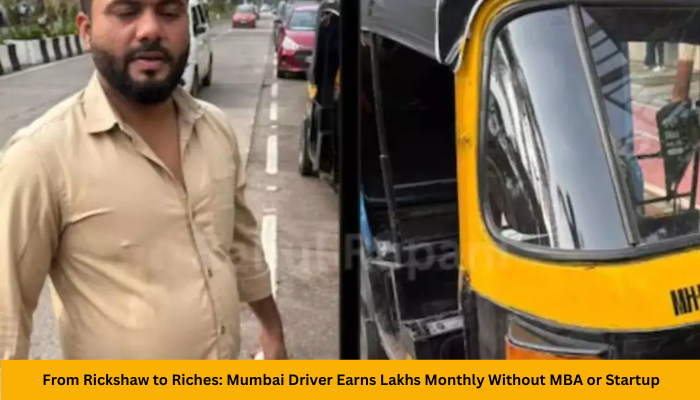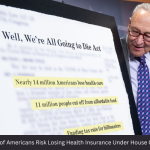In a city like Mumbai, where the Hustle is a heartbeat and overflow with people pursuing his dreams on the streets, an auto-rickshaw driver has quietly created a business empire from the most likely the possibility of ideas-and without any formal education, business plan, app or funding. His monthly earnings? A stunning ₹ 5 to ₹ 8 lakh – a figure that takes many experienced IT professionals, startup founders and even chartered accountants home. This is not the story of a person who created his fate through traditional means, but the one who paid attention to a simple problem, prepared a road-smart solution, and turned it into a high-profitable service. The auto driver, whose name is yet to be known, has created a prosperous business just out of the United States Consulate in Mumbai – and the secret of his success lies in solving a very specific problem for hundreds of people every day.
The Problem: No Bags Allowed Inside the US Consulate

The mumabi auto driver story came out when a famous product leader and an experienced entrepreneur, Rahul Rupani, shared his personal experience on LinkedIn. Like many others, Rupni went to the US consulate for his visa appointment. But as he approached the security door, he was informed that he could not take his bag inside the campus. The rules were strict – no handbags, backpacks or even small pouches were allowed. And surprisingly, no official locker, clockrs or storage facilities were provided for visitors. The message of security was blunt: “You cannot take the bag in. Understand it yourself.” Rupni faced a dilemma, which faced thousands of others every week – where the confused and cumbersome standing on the pavement – where they participate in their appointment inside the consulate. When he was approached by an auto-rickshaw driver parked nearby, who negligent a solution offered.
The Business Model: Simplicity Meets Ingenuity
At first glance, the offer might seem expensive. But when you consider the context — high-stress visa appointments, lack of alternatives, tight schedules — it becomes clear that this was not just a bag-holding service, but a lifeline for desperate people. Visitors are often flying in from different cities, carrying important documents and personal items. Trust becomes a premium commodity, and the driver’s calm assurance and professional tone were enough to convince Rupani.
And he wasn’t the only one. According to Rupani’s post, the Mumbai auto driver runs this service daily and typically handles 20 to 30 customers every day. Each customer pays ₹1,000 for the temporary safekeeping of their bags. That amounts to a daily income of ₹20,000 to ₹30,000 — or roughly ₹6 to ₹8 lakhs per month — all earned without even starting his engine.
Let that sink in: a man with no app, no tech team, no seed funding, and no MBA — just a keen eye for human behavior, a fixed location, and unwavering consistency — is earning more than many corporate executives in India.
Why It Works: A Study in Hyper-Local Demand
It is a textbook example of identifying a hyper-local requirement and solving it with minimal resources. American consulates look at hundreds of appointments daily. Many people come alone, some are unaware of the cities and cities, and most strict goods are unaware of the rules. When gone to the gate, they are left scratching for a solution-and when this auto driver steps with a ready answer. That price – ₹ 1,000 – may look standing, but it is a classic case of pricing based on urgency and lack of options.
And given the amount of customers, that price is not a preventive. In fact, it can also indicate reliability and belief – when you are handing over valuable goods to a stranger, the characteristics of that thing. He has no competition, no overhead cost, and no dependence on technology. His only property is his auto, which he no longer use for transportation. They created a cash-cavity, zero-ravages, high-margins business from scratch-and it is working with a startup efficiency, minus Georgon.
The Internet Reacts: Admiration and Inspiration

Rupni’s LinkedIn Post hit a raga with thousands. Industries people praised the driver’s creativity, Udham and ability to solve the real world problem. At a time when startup culture often glorifies pitch decks, seed rounds and unicorn valuations, this story reminds people that business at its core is about identifying a need and serving it effectively. “When you have such insight, MBA is required?” One user commented. “This is a lesson in entrepreneurship. Not from Harvard, but from the streets of Mumbai,” another said. The story also talked about the power of simplicity, opportunities outside the formal systems and the need to appreciate the blue-collar innovation.
Conclusion
This story of Mumbai Auto Driver is a powerful reminder who often hides the opportunity in plain vision. Innovation does not always require advanced technology or investment capital – sometimes, it only takes awareness, courage and desire to work. So the next time someone tells you that success requires a professional degree, a startup, or enterprise capital funding, tell him about the man who parked his auto outside a consulate, and made a mini-ampire a bag at a time.
Also Read : From PIN Codes To DIGIPIN: India’s Leap In Address Technology
Frequently Asked Questions
1. How is the Mumbai auto driver earning ₹5 to ₹8 lakhs a month?
The driver offers a unique bag-holding service outside the US Consulate in Mumbai. Since visitors are not allowed to carry bags inside and there’s no official storage, he charges ₹1,000 per customer to safely keep their belongings in his auto. With 20–30 customers daily, he earns ₹20,000–₹30,000 a day.
2. Does the mumbai auto driver actually drive his rickshaw anymore?
No, the driver reportedly does not drive his auto around the city. He simply parks it near the consulate every day and uses it as a secure storage vehicle for customers’ bags.
3. How did this story become public?
Rahul Rupani, a product leader at Lenskart, shared the story on LinkedIn after experiencing the service himself during a visa appointment. His post went viral, garnering attention for the driver’s entrepreneurial approach.
4. What’s the biggest lesson from this story?
This mumbai suto driver story teaches that entrepreneurship doesn’t always require an MBA, tech, or funding. Sometimes, observing a real-world problem and providing a simple, consistent solution can lead to massive success.
5. How do customers know their bags are safe?
The mumbai auto driver builds trust through daily consistency and word-of-mouth. His calm demeanor and confidence in his service help reassure customers about the safety of their belongings.










